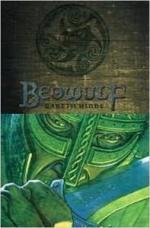|
This section contains 5,199 words (approx. 18 pages at 300 words per page) |

|
SOURCE: "Succession and Glory in Beowulf" in Journal of English and Germanic Philology, Vol. 90, No. 4, October, 1991, pp. 491-504.
In the following excerpt, Schrader traces Beowulf's involvement in the lines of succession for both Danish and Geatish kingship, and illustrates how earthly glory and valor serve as important but fragile marks of distinction for these pagan rulers.
At the opening of Beowulf the poet celebrates the glory (þrym) and valor (ellen) of the ancient Danish kings (þeodcyninga, æþelingas). [All Beowulf quotations are from Beowulf and the Fight at Finnsburg, ed. Fr. Klaeber, 3d ed. (Lexington, Mass.: Heath, 1950).] For more than sixty lines he traces these qualities from their apparent beginning with Scyld Scefing to their culmination in Hrothgar, a great-grandson. This is the full Scylding line to that point, but the poem makes clear that there were earlier rulers of the Danes, presumably living before Sceaf, men such as...
|
This section contains 5,199 words (approx. 18 pages at 300 words per page) |

|


